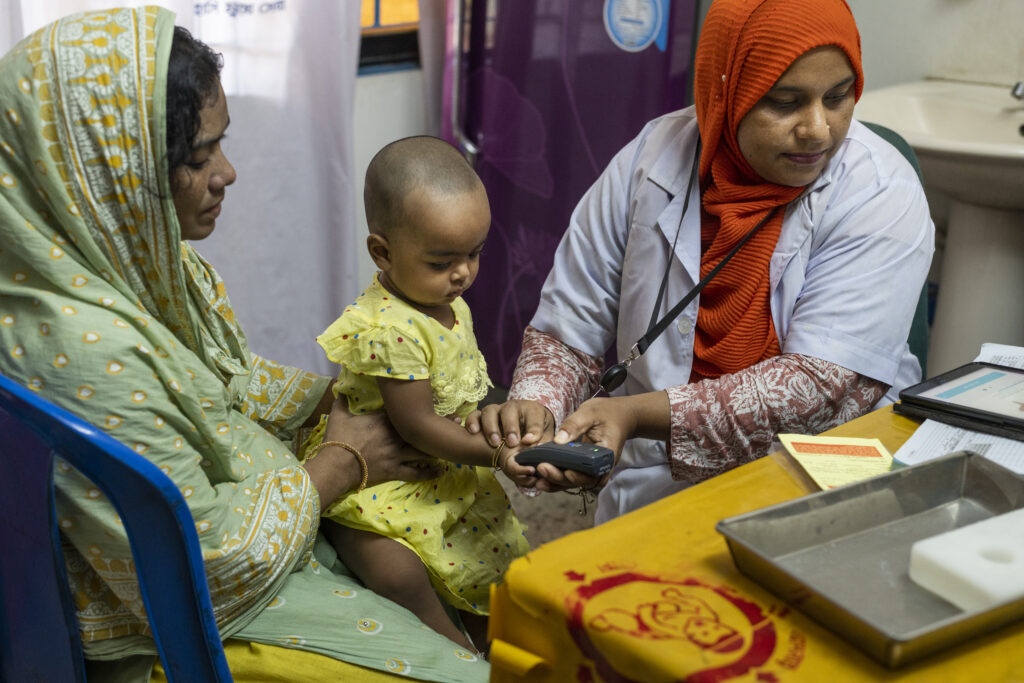Ensure aid reaches those who need it most through secure, practical biometric tools
Lesson Learned:
Funding organizations working to build the capacity of other nonprofits can amplify your impact.
Global humanitarian organizations have always had difficulty providing health and humanitarian aid to intended beneficiaries due to the widespread lack of formal identification.[1]
According to the World Bank, 850 million people globally lack a formal ID, most of whom live in low and lower-middle income economies in Sub-Saharan Africa and South Asia.[2] Without reliable ID, tracking outcomes and delivering follow-up care are difficult.
Simprints provides biometric identification tools so that organizations can reach those who need aid most, particularly those in Sub-Saharan Africa and South Asia.
“I was merely asked to place my four fingers, one by one, on the tiny fingerprint machine. After evaluating my eyelid, the eye doctor swiftly found my records and entered the information on his phone. … all of the patients were satisfied because there was no longer any lengthy waiting”
– Sosina, patient at a health center that uses Simprints in Ethiopia
“Simprints makes our workflow flawless. We had challenges before, like supply bottlenecks. We’d end up giving too many shoes, only to realise not too many of these children actually exist. So we tied our distribution to a fingerprint.”
– COHESU frontline worker

What it does
While many governments and organizations issue physical identification cards, these can be lost or damaged, particularly when transient populations uses them.[3] Simprints has helped aid organizations and governments in 17 countries integrate biometric identification technology into their projects to provide more reliable identification.
Simprints works with client organizations, including BRAC, the world’s largest non-governmental organization, and the Federal Ministry of Health Ethiopia, to identify the right biometric measure —face, fingerprint, or both — given the client’s needs and technological capabilities.
Frontline aid workers tested Simprints’ proprietary Vero Scanner for over 700 hours to ensure it stood up for use in extreme heat and no electricity. The scanner is small, portable, dust-proof, and waterproof. It’s usable both online and offline and powered by a rechargeable Lithium-ion battery. The organization’s face biometrics method uses a standard smartphone camera to guide the user through a simple image capture. This contactless method is particularly useful for frontline workers treating infectious diseases. The fingerprint and face scanners are connected wirelessly to an app that matches a person’s biometric information with their record.
Simprints provides a three-day training course for frontline workers. Client organizations also have a direct line to the organization to ask technical questions and troubleshoot.
Simprints engages with beneficiary communities about privacy and security, translating privacy and consent notices into local languages. The organization has implemented strong privacy protocols because of the sensitive nature of biometric data. Images are deleted from mobile devices automatically and sent to secure cloud storage. Biometric data is encrypted end-to-end, and instead of attaching full names to biometric data, Simprints uses randomly generated Globally Unique Identifiers (GUIDs).
How effective it is
As of 2024, client organizations have used Simprints to serve 3 million beneficiaries. In 2023, 80% or more of frontline workers who used Simprints’ technology reported it was easy to use.
Simprints client organizations are more effective as a result. For example, BRAC found that in its maternal health efforts in Bangladesh, 37.4% of women in the Simprints cohort achieved the World Health Organization-recommended eight antenatalcare (ANC) visits, compared to 13.1% in the control group — an improvement of 185%. Studies show that achieving a minimum of eight ANC visits can reduce perinatal deaths by 43% to 68%.[4]
Cohesu, a grassroots NGO in Kenya that worked with Simprints, was able to reduce their in-school work times from 1-2 days to under 4 hours because of Simprints’ technology.
Similarly, Simprints’ work with the Ethiopia Federal Ministry of Health enabled health workers to identify clients 2.7 times faster than a digital ID search and 8 times faster than a manual name search while reducing data discrepancies from 39% to less than 5%.
How philanthropy helps
About 60% of Simprints’ funding comes from its contracts with partners, with the rest from philanthropy. Additional philanthropic support will enable Simprints to better assess their impact while enabling the organization to provide more support for its open-source software. Learn more:
https://www.simprints.com/
More ways to help
For more nonprofits using tech for social impact, see Housing Connector, which uses a tech-powered platform to connect high-risk individuals with vacant housing, and Food 4 Education, which uses tech to increase the efficiency and efficacy of school feeding programs.
Notes
[1] Nocita, N. (2019, December 30). Where that Used Teddy Bear Really Goes: Corruption and Inefficiency in Humanitarian Aid. Harvard International Review. https://hir.harvard.edu/where-that-used-teddy-bear-really-goes-corruption-and-inefficiency-in-humanitarian-aid/
[2] Clark, J., Metz, A., & Casher, C. (2023, February 6). 850 million people globally don’t have ID—why this matters and what we can do about it. World Bank Blogs. https://blogs.worldbank.org/en/digital-development/850-million-people-globally-dont-have-id-why-matters-and-what-we-can-do-about
[3] Weibel, D., Schelling, E., Bonfoh, B., Utzinger, J., Hattendorf, J., Abdoulaye, M., Madjiade, T., & Zinsstag, J. (2008). Demographic and health surveillance of mobile pastoralists in Chad: Integration of biometric fingerprint identification into a geographical information system. Geospatial Health, 3(1), 113–124. https://doi.org/10.4081/gh.2008.237
[4] World Health Organization. (2016, November 7). New guidelines on antenatal care for a positive pregnancy experience. https://www.who.int/news/item/07-11-2016-new-guidelines-on-antenatal-care-for-a-positive-pregnancy-experience
